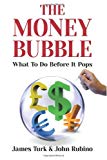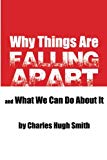|
JOHN RUBINO'SLATEST BOOK |
||||||||||||||||||||||||||||||||||||||||||||||||||||||||||||||||||||||||||||||||||||||||||||||||||||||||||||||||||||||||||||||||||||||||||||||||||||||||||||||||||||||||||||||||||||||||||||||||||||||||||||||||||||||||||||||||||||||||||||||||||||
"MELT-UP MONITOR " Meltup Monitor: FLOWS - The Currency Cartel Carry Cycle - 09 Dec 2013 Meltup Monitor: FLOWS - Liquidity, Credit & Debt - 04 Dec 2013 Meltup Monitor: Euro Pressure Going Critical - 28- Nov 2013 Meltup Monitor: A Regression-to-the-Exponential Mean Required - 25 Nov 2013
|
"DOW 20,000 " Lance Roberts Charles Hugh Smith John Rubino Bert Dohman & Ty Andros
|
HELD OVER
Currency Wars
Euro Experiment
Sultans of Swap
Extend & Pretend
Preserve & Protect
Innovation
Showings Below
"Currency Wars "
|
"SULTANS OF SWAP" archives open ACT II ACT III ALSO Sultans of Swap: Fearing the Gearing! Sultans of Swap: BP Potentially More Devistating than Lehman! |
"EURO EXPERIMENT"
archives open EURO EXPERIMENT : ECB's LTRO Won't Stop Collateral Contagion!
EURO EXPERIMENT: |
"INNOVATION"
archives open |
"PRESERVE & PROTE CT"
archives open |

Mon. June 1st, 2015
Follow Our Updates
on TWITTER
https://twitter.com/GordonTLong
AND FOR EVEN MORE TWITTER COVERAGE
![]()
| MAY | ||||||
| S | M | T | W | T | F | S |
| 1 | 2 | |||||
| 3 | 4 | 5 | 6 | 7 | 8 | 9 |
| 10 | 11 | 12 | 13 | 14 | 15 | 16 |
| 17 | 18 | 19 | 20 | 21 | 22 | 23 |
| 24 | 25 | 26 | 27 | 28 | 29 | 30 |
| 31 | 1 | 2 | 3 | 4 | 5 | 6 |
KEY TO TIPPING POINTS |
| 1- Bond Bubble |
| 2 - Risk Reversal |
| 3 - Geo-Political Event |
| 4 - China Hard Landing |
| 5 - Japan Debt Deflation Spiral |
| 6- EU Banking Crisis |
| 7- Sovereign Debt Crisis |
| 8 - Shrinking Revenue Growth Rate |
| 9 - Chronic Unemployment |
| 10 - US Stock Market Valuations |
| 11 - Global Governance Failure |
| 12 - Chronic Global Fiscal ImBalances |
| 13 - Growing Social Unrest |
| 14 - Residential Real Estate - Phase II |
| 15 - Commercial Real Estate |
| 16 - Credit Contraction II |
| 17- State & Local Government |
| 18 - Slowing Retail & Consumer Sales |
| 19 - US Reserve Currency |
| 20 - US Dollar Weakness |
| 21 - Financial Crisis Programs Expiration |
| 22 - US Banking Crisis II |
| 23 - China - Japan Regional Conflict |
| 24 - Corruption |
| 25 - Public Sentiment & Confidence |
| 26 - Food Price Pressures |
| 27 - Global Output Gap |
| 28 - Pension - Entitlement Crisis |
| 29 - Central & Eastern Europe |
| 30 - Terrorist Event |
| 31 - Pandemic / Epidemic |
| 32 - Rising Inflation Pressures & Interest Pressures |
| 33 - Resource Shortage |
| 34 - Cyber Attack or Complexity Failure |
| 35 - Corporate Bankruptcies |
| 36 - Iran Nuclear Threat |
| 37- Finance & Insurance Balance Sheet Write-Offs |
| 38- Government Backstop Insurance |
| 39 - Oil Price Pressures |
| 40 - Natural Physical Disaster |
Reading the right books?
No Time?
We have analyzed & included
these in our latest research papers Macro videos!
![]()
OUR MACRO ANALYTIC
CO-HOSTS
John Rubino's Just Released Book
Charles Hugh Smith's Latest Books
Our Macro Watch Partner
Richard Duncan Latest Books
MACRO ANALYTIC
GUESTS
F William Engdahl
OTHERS OF NOTE
Book Review- Five Thumbs Up
for Steve Greenhut's
Plunder!
TODAY'S TIPPING POINTS
|
Have your own site? Offer free content to your visitors with TRIGGER$ Public Edition!
Sell TRIGGER$ from your site and grow a monthly recurring income!
Contact [email protected] for more information - (free ad space for participating affiliates).
HOTTEST TIPPING POINTS |
Theme Groupings |
||||||||||
We post throughout the day as we do our Investment Research for: LONGWave - UnderTheLens - Macro
|
|||||||||||
|
MOST CRITICAL TIPPING POINT ARTICLES TODAY
|
|
||||||||||
|
CHECK OUT OUR PAGE DEDICATED TO FINANCIAL REPRESSION The Financial Repression AuthorityTM
|
|||||||||||
| THESIS & THEMES | |||||||||||
FINANCIAL REPRESSION - Coming Capital Controls PROTECTING BANKS FROM THE PEOPLE The Coming Capital Controls Are Designed To Protect The Banks From You 05-26-15 Submitted by Simon Black via Sovereign Man blog, Of all the peculiarities about human nature, one of the most interesting in my opinion is that we’re so resistant to change. Humans simply don’t deal with it well. We tend to root. We find comfort in familiarity. And, even when the familiar becomes unpleasant, we still put up with it. We prefer to suffer through something that we know rather than change things and risk the unknown. This is why people stay in bad relationships. Or why they continue working for bosses they dislike at jobs they despise. It’s the fear of change. But everyone… absolutely everyone… has a breaking point. It’s a point where the status quo becomes so uncomfortable, so painful, that we snap. And walk away. It’s the same in finance. People stick with what they know, even if they have to endure a little pain and suffering. Today’s current banking environment is the perfect example. In the US, interest rates for most bank accounts are so low that they fail to keep up with inflation. You are doing very well if you can generate a whopping 0.5% interest. In Canada rates can be a bit higher. But when you compare these rates to even the official rates of inflation, it’s clear that savers are guaranteed to lose money. In Europe it’s even worse. Interest rates at many banks are negative… so savers are actually paying the banks. In theory there’s nothing wrong with paying your banker, presuming that they’re providing a real service. Traditionally, banks were no different than a secure storage facility: depositors would pay a fee in exchange for the bank safeguarding their savings. These days a lot of people might pay 50 bucks a month at a U-Store-It place to store $10,000 worth of junk. So why not pay a small fee for a banker to store $10,000 worth of cash? The reason is that banks don’t operate like a storage facility. It’s not like the proprietor of the U-Store-It is loaning out your sofa to make a few bucks on the side. If he were, it would be called fraud, and he’d go to jail for it. Banks, on the other hand, are actually ENCOURAGED to take your hard earned savings and make a few extra bucks on the side. In fact they have a history of making often absurd loans and wild, overleveraged bets using your money. Not theirs. So just consider how insulting this is to actually to pay them interest; paying for the privilege of them gambling with your savings. It’s obscene. But like I said, we all have a breaking point. And there will reach a level where rates get so low (or negative) that no rational person would continue holding money at a bank. Why bother? You could just withdraw most of your balance, then pay a small fee for a safety deposit box that you stuff full of cash. Cheaper. Easier. Better. Cash in your hand might pay 0% interest… but at least it doesn’t cost you. But there’s a huge problem with this approach: there’s very little physical cash in the system. According to the Federal Reserve, the amount of physical US currency in circulation is about $1.3 trillion. Yet the amount of “M2” money supply is nearly ten times that amount. So just imagine if even 10% of people hit their breaking points and withdrew their money in cash– there wouldn’t be enough cash in the system to support this demand. And the banks would subsequently collapse. If governments have proven anything to us over the last seven years, it is that they will do anything to keep the banks from going down. This is a major reason why they’re trying to get rid of cash, and in some cases even criminalize it under the ridiculous auspices of the war on terror. In the US, some of the more prevalent names in finance have started calling for an outright ban of cash, including a prominent economist from Citigroup. (This is a rather convenient position for Citigroup.) Greece is another great example– they’ve already implemented a tax on cash withdrawals and wire transfers. And further restrictions will inevitably follow. These measures are all different forms of capital controls, designed to prevent you from taking your money away from such a destructive system. In fact, I expect the next round of capital controls will be designed to protect the banks… from you. When a government is bankrupt, the central bank is nearly insolvent, the banking system is illiquid, and an entire population suffers from interest rates that are either negative or below the rate of inflation, capital controls are a foregone conclusion. They’ll hit just as soon as enough people reach their breaking points… when they say ‘enough is enough’ and they take their money out of the banking system. Governments have done it before: they’ll declare a ‘bank holiday’ and then impose some sort of freeze on withdrawals. Just like we saw in Cyprus in 2013. Or the US in 1933. The data and history are very clear on what will likely happen. We just can’t pinpoint the date. Very few people will guess correctly and withdraw their cash the day before capital controls are imposed. That’s why it makes sense to take certain steps now.
|
06-01-15 | THEMES | |||||||||
| MOST CRITICAL TIPPING POINT ARTICLES THIS WEEK - May 31st, 2015 - June 6th, 2015 | |||||||||||
| BOND BUBBLE | 1 | ||||||||||
| RISK REVERSAL - WOULD BE MARKED BY: Slowing Momentum, Weakening Earnings, Falling Estimates | 2 | ||||||||||
| GEO-POLITICAL EVENT | 3 | ||||||||||
| CHINA BUBBLE | 4 | ||||||||||
| JAPAN - DEBT DEFLATION | 5 | ||||||||||
EU BANKING CRISIS |
6 |
||||||||||
| TO TOP | |||||||||||
| MACRO News Items of Importance - This Week | |||||||||||
GLOBAL MACRO REPORTS & ANALYSIS |
|||||||||||
US ECONOMIC REPORTS & ANALYSIS |
|||||||||||
| CENTRAL BANKING MONETARY POLICIES, ACTIONS & ACTIVITIES | |||||||||||
| Market | |||||||||||
| TECHNICALS & MARKET |
|
||||||||||
| COMMODITY CORNER - AGRI-COMPLEX | PORTFOLIO | ||||||||||
| SECURITY-SURVEILANCE COMPLEX | PORTFOLIO | ||||||||||
| THESIS - Mondays Posts on Financial Repression & Posts on Thursday as Key Updates Occur | |||||||||||
| 2015 - FIDUCIARY FAILURE | 2015 | THESIS 2015 |  |
||||||||
| 2014 - GLOBALIZATION TRAP | 2014 |  |
|||||||||
|
2013 2014 |
|||||||||||
2011 2012 2013 2014 |
|||||||||||
| THEMES - Normally a Thursday Themes Post & a Friday Flows Post | |||||||||||
I - POLITICAL |
|||||||||||
| CENTRAL PLANNING - SHIFTING ECONOMIC POWER - STATISM | THEME | ||||||||||
- - CORRUPTION & MALFEASANCE - MORAL DECAY - DESPERATION, SHORTAGES. |
THEME |  |
|||||||||
| - - SECURITY-SURVEILLANCE COMPLEX - STATISM | M | THEME | |||||||||
| - - CATALYSTS - FEAR (POLITICALLY) & GREED (FINANCIALLY) | G | THEME | |||||||||
II-ECONOMIC |
|||||||||||
| GLOBAL RISK | |||||||||||
| - GLOBAL FINANCIAL IMBALANCE - FRAGILITY, COMPLEXITY & INSTABILITY | G | THEME | |||||||||
| - - SOCIAL UNREST - INEQUALITY & A BROKEN SOCIAL CONTRACT | US | THEME | |||||||||
| - - ECHO BOOM - PERIPHERAL PROBLEM | M | THEME | |||||||||
| - -GLOBAL GROWTH & JOBS CRISIS | |||||||||||
| - - - PRODUCTIVITY PARADOX - NATURE OF WORK | THEME | MACRO w/ CHS |
|||||||||
| - - - STANDARD OF LIVING - EMPLOYMENT CRISIS, SUB-PRIME ECONOMY | US | THEME | MACRO w/ CHS |
||||||||
III-FINANCIAL |
|||||||||||
| FLOWS -FRIDAY FLOWS | MATA RISK ON-OFF |
THEME | |||||||||
| CRACKUP BOOM - ASSET BUBBLE | THEME | ||||||||||
| SHADOW BANKING - LIQUIDITY / CREDIT ENGINE | M | THEME | |||||||||
| GENERAL INTEREST |
|
||||||||||
| STRATEGIC INVESTMENT INSIGHTS - Weekend Coverage | |||||||||||
|
SII | ||||||||||
|
SII | ||||||||||
|
SII | ||||||||||
|
SII | ||||||||||
| TO TOP | |||||||||||
Read More - OUR RESEARCH - Articles Below
Tipping Points Life Cycle - Explained
Click on image to enlarge
TO TOP
�
TO TOP






































